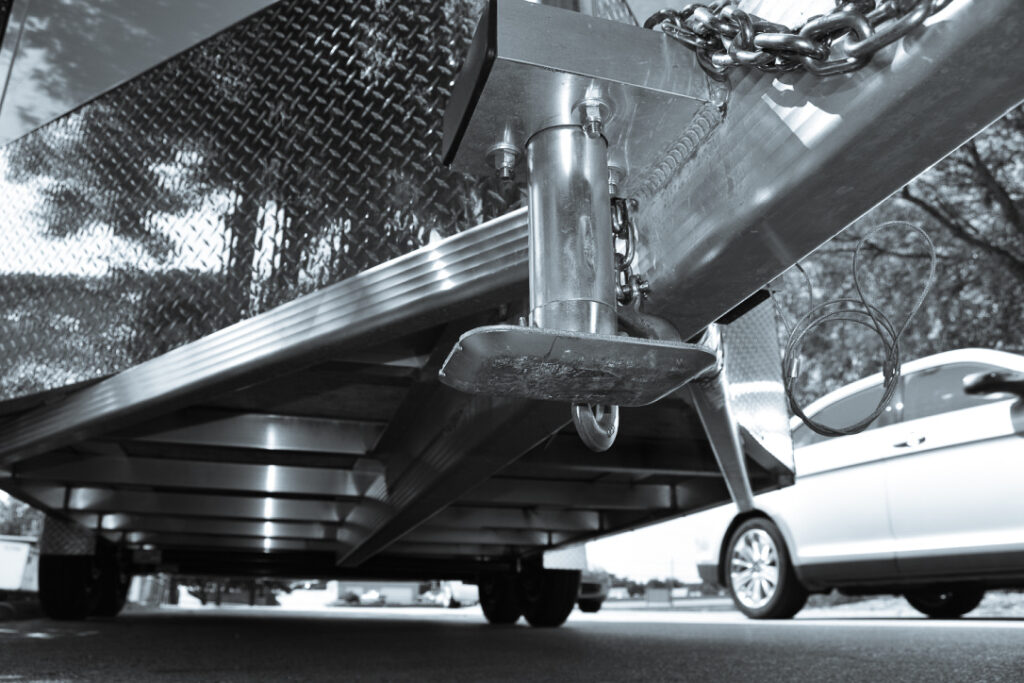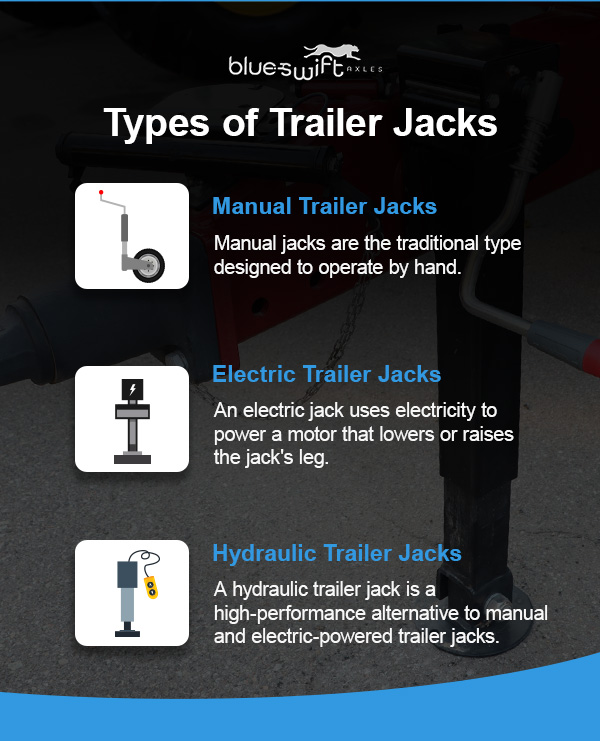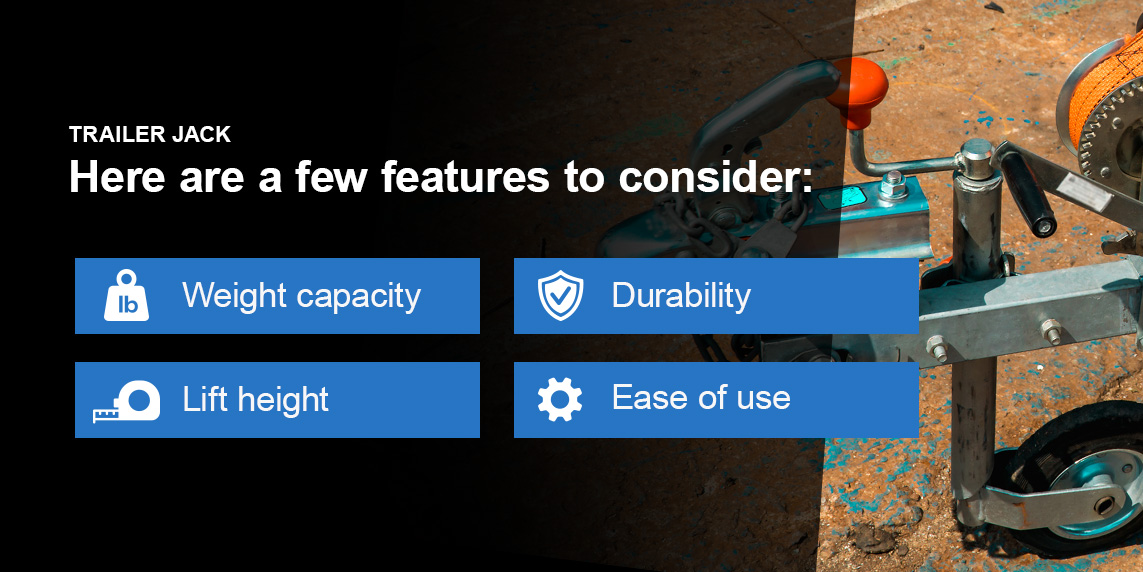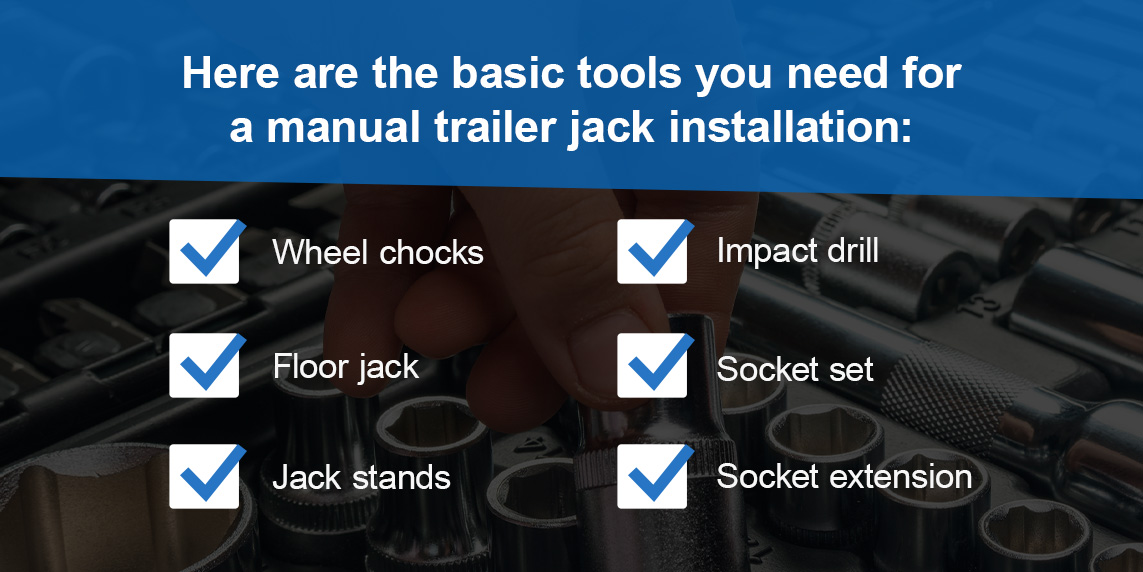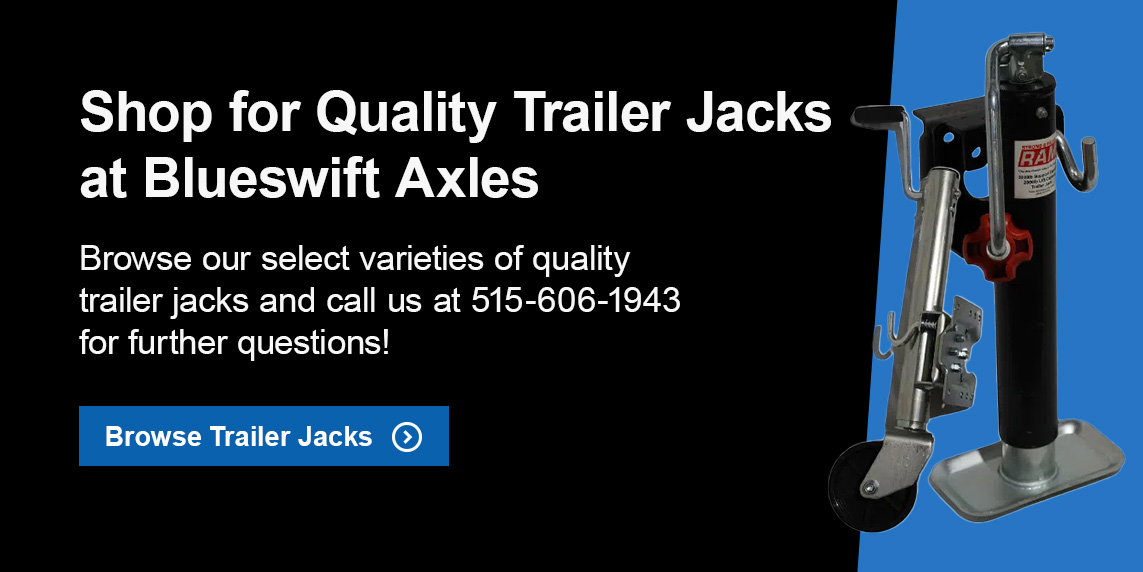If you own a trailer, a trailer jack is undoubtedly necessary. Trailers are heavy, even small ones, and once loaded, raising or lowering the trailer enough to hook or unhook it from the towing vehicle is nearly impossible without a tongue jack. The importance of trailer jacks is clear because you need them to elevate and stabilize the trailer every time you load, offload or hitch.
The correct jack also impacts trailer maintenance as it ensures stability and proper weight distribution whether the trailer is connected to the tow vehicle or not. These functions eliminate stress on individual components, slowing down wear and tear. This guide highlights all you need to know about trailer jacks.
What Is a Trailer Jack?
In the automotive industry, jacks are common upright devices that lift up a vehicle’s frame to allow tire replacement and maintenance. Trailer jacks are similar, except they are designed to raise the trailer tongue to a specific height, making it level. They make it easy to hitch and unhitch the vehicle, load and unload and work in the trailer.
While they all serve the same function, the various types of trailer jacks provide additional features that impact the level of convenience each type offers. When choosing trailer parts, a quality jack should be a priority to ensure the safe and efficient use of your trailer.
Types of Trailer Jacks
Trailer jacks vary based on various factors. However, the basic difference that separates them into three types or categories is how they are powered. Here are the different types of trailer jacks:
Manual Trailer Jacks
Manual jacks are the traditional type designed to operate by hand. They are simple and easy to use, featuring a handle or hand crank that you turn on one side or the other to lift and lower your trailer tongue. Since manual jacks rely on physical strength, they can be challenging to use. The main advantage of manual operation is that there are no limitations to when and where you can use the jack because your strength is the only source of power needed.
Electric Trailer Jacks
An electric jack uses electricity to power a motor that lowers or raises the jack’s leg. It features a head with controls that allow you to operate the jack with the touch of a button. These jacks run on trailer or tow vehicle battery power. However, you can also operate them with any source of 12-volt power. Electric jacks have smart variants featuring controls that allow presetting positions for more convenience and accurate leveling.
Hydraulic Trailer Jacks
A hydraulic trailer jack is a high-performance alternative to manual and electric-powered trailer jacks. These high-speed, heavy-duty trailer jacks rely on hydraulics to lift and lower the trailer. They have varying weight capacities and operating pressure, which makes them suitable for different trailer types, from small utility trailers to freight-hauling flatbeds. As a high-capacity power tongue jack, a hydraulic jack offers a reliable function with exceptional durability.
Trailer Jack Configurations
Aside from the different types, trailer jacks come in various configurations or styles that contribute to their capacity for diverse applications. Keep in mind that trailer jacks may consist of one or more of these configurations. Here are common trailer jack styles to consider:
- A-frame jacks: These are specialized jacks designed to bolt onto an A-frame hitch.
- Swivel jacks: These jacks have a rotating mounting base and locking pin that allows you to swivel it parallel to the frame when the trailer is being towed. Swivel trailer jacks are suitable for light-duty trailers as they have a lower weight rating. However, the swivel functionality allows for more ground clearance, and prevents the trailer jack from being damaged when being towed over uneven terrain.
- Side wind and top wind:Side wind jacks are manual jacks with side-mounted handles. To raise or lower the jack’s leg, you crank the handle using an up-forward-down-backward motion. The movement allows you to leverage body weight for the manual operation. While similar to side wind, top wind jacks have their handles mounted at the top, enabling sideways rotations. Both cranking styles are reliable, and choice depends on what feels comfortable.
- Weld-on jacks: These are permanent, heavy-duty jacks welded to the trailer’s frame. The permanent connection makes them stable, robust and highly reliable for heavy-duty hauling. Weld-on trailer jacks have some of the highest weight ratings and some have a swivel feature at the welded top, allowing the jack to swing out of the way when the trailer is moving.
- Round and square tube: Trailer jacks can be square or rounded. Round tube jacks have a round body and leg, while the square tube jacks have a square body and leg build. There is more to the difference in construction than style, as square tube jacks are more robust and designed for heavy-duty applications. While round tube jacks can have fixed or flexible tongue connections, square tube jacks require direct welding.
- Bolt-on jacks: These jacks are similar to the weld-on ones, but with one exception: they need bolting to the trailer’s tongue instead of permanent welding. The use of bolts makes bolt-on trailer jacks more flexible. They are easy to adjust, move to a different trailer or replace as needed.
- Drill jacks: These jacks combine the convenience of electric operation with the reliability of manual operation. They are similar to standard crank ones since they don’t have electric components. However, they feature a drill mechanism at the head that allows powered drill operation. As such, they don’t require physical force to lower or raise the trailer. They also have a handle to revert to manual cranking if the drill runs out of power.
Features to Consider When Choosing a Trailer Jack
Various factors determine the best trailer jacks. These include your specific terrain, trailer type and hauling needs, and the specific trailer jack features you’re looking for.
Here are a few features to consider:
- Weight capacity: Trailer jacks have ratings designed to accommodate your trailer’s tongue weight. Your tongue weight should be roughly 10% of the gross trailer weight (GTW). The GTW is the total weight of your fully loaded trailer, so find a jack that matches that 10%.
- Lift height: Trailers have varying heights depending on their sizes. Find a jack with the right lift height to accommodate your trailer tongue’s leveling height.
- Durability: When shopping for trailer jacks, ask about the materials they are made of to ensure strength and weather resistance.
- Ease of use: Trailer jacks are simple devices that should be easy to use.
Trailer Jack Safety and Maintenance
Safety and maintenance are critical aspects of trailers that go hand in hand. Proper maintenance of components, including jacks, promotes overall trailer stability and reduces stress on other parts. A well-functioning jack lowers the risks of failures that could lead to accidents and injuries. Proper jack maintenance begins with routine checks to ensure every component is in good condition and can safely lift and stabilize your trailer.
Troubleshooting Common Problems
Look for signs of rust, difficulty in cranking, general wear and electrical failures, which are common issues that cause trailer jacks to malfunction. Here are some possible solutions to these issues:
- Rust: Trailer jacks are susceptible to rust. Lubricating its parts will help prevent corrosion.
- Difficulty cranking: If you’re struggling to crank, the jack may be broken or the internal parts are rusty. Try greasing, and if that doesn’t work, seek professional assistance.
- General wear: Jacks comprise metal components that are vulnerable to the elements. Exposure to outdoor temperatures, dust and rain leads to wear and tear over time. While you can repair damage to the outer body, weld cracks and replace bolts and handles, it’s best to replace the entire jack to ensure safety and structural integrity.
- Electrical failures: For electric jacks, failure to operate means an issue with the electrical system. You could check your power source to confirm a proper connection. Examine the battery for signs of corrosion. It’s best to let a professional diagnose and resolve electrical issues such as switch malfunctions, inline fuse and ground connection.
Safety Practices
Safety is crucial when handling trailer jacks. Always position the trailer on level ground to facilitate stability and prevent accidents. Your jack lifts extreme weight, so handle it with care when positioning and cranking and avoid overloading it. Also, avoid working beneath the trailer or tongue area when the jack is in place unless you have inserted a floor jack and jack stands.
Top Brands and Models
Navigating diverse varieties of quality trailer jacks can be confusing. Here are some of the top-rated trailer jacks on the market:
- RAM TJD-12000SP-R2 Trailer Jack: RAM is one of the best trailer jack brands around, and the TJD-12000SP-R2 model is a reliable top-of-the-line jack designed for heavy-duty applications. It’s a weld-on side wind jack with square tube and drop leg features and has a capacity of up to 12,000 pounds.
- RAM MJ-1500B-DWL Marine Jack:This side wind marine jack with dual-wheel swivel functionality suits most boat trailers. It can hold up to 1,500 pounds, making it suitable for light and moderate-duty use.
- Ironton 12 Volt Electric Trailer Jack: Ironton’s model 57402 is a specialized A-frame with a 3,500-pound lift capacity, suitable for heavy-duty use.
- Ultra-Tow XTP Fast-Action Square Tube Jack: The 47253 universal mount jack has a 2,000-pound capacity and offers a robust square tube body, side wind handle and bolt-on features. Its strength and durability make it suitable for heavy-duty applications.
- RAM TJD-5000-S Square Tube Jack:The RAM TJD-5000-S is a side wind square tube jack that has a 3,000-pound lift capacity and a solid tube for enhanced stability in tough conditions. It’s a powerful direct-weld jack fit for heavy-duty and off-road purposes.
How to Install or Replace a Trailer Jack
Depending on the type of jack, installing a new trailer jack can be an easy DIY project or a complex task that requires a professional. It’s best to let an expert handle weld-on jacks for heavy-duty trailers due to the need to correctly remove the old weld and apply a strong one to support the new jack.
The same goes for electric trailer jacks because they need adequate power and correct wiring. If you can safely handle an electric jack’s wiring and power needs, the installation steps are almost similar to the manual types.
Tools You Need
Here are the basic tools you need for a manual trailer jack installation:
- Wheel chocks
- Floor jack
- Jack stands
- Impact drill
- Socket set
- Socket extension
Step-by-Step DIY Trailer Jack Installation
Remember that trailer jacks vary by type, configuration, and manufacturer-specific features. Before installing one, review the manufacturer’s manual for specific guidelines. Here are the typical steps for installing manual trailer jacks:
- Support the trailer: Set the trailer on level ground and apply wheel chocks to prevent movement. Lift the trailer into position using a floor jack and insert jack stands under the frame for additional support.
- Remove the old jack: Start by removing the foot connected to the inner tube or wheel if it’s a swivel. Pull out the safety pin securing the connection. Unscrew the bolts that keep the jack in place, remove the old jack and clean the mounting area.
- Install the new jack: Position the new jack in place and fasten the bolts. Attach the last component, the foot or wheel, to the bottom of the new jack.
- Test the jack: You want to ensure the installation is correct. To test the new tongue jack, remove the floor jack and jack stands and crank the tongue jack up and down.
FAQs About Trailer Jacks
Here are frequently asked questions about trailer jacks:
- What are trailer jacks used for? A trailer jack raises the tongue of a trailer to a level position, keeping the trailer steady for hitching or unhitching the tow vehicle or for storage.
- What kind of jack do I need for a trailer? You need trailer jacks designed to lift your trailer’s tongue. They also come in various types and features.
- How much weight can a trailer jack hold? Trailer jacks have varying weight capacities designed to accommodate the tongue weight of different trailer types and sizes.
- How do I know what trailer jack to buy? The right trailer jack should match your trailer’s tongue weight and have good ground clearance.
Shop for Quality Trailer Jacks at Blueswift Axles
Trailer jacks are vital accessories that ensure the proper use of your trailer. Selecting the correct tongue jack for your needs enhances stability and performance while serving you long-term. Considering a trailer jack supports the weight of your trailer, it’s important to invest in quality to protect your trailer and maintain safety.
Blueswift Axles is a reputable trailer parts provider known for top quality and fast axle build time. We believe in providing reliable products and exceptional services that meet your needs. Browse our select varieties of quality trailer jacks and call us at 515-606-1943 for further questions!
